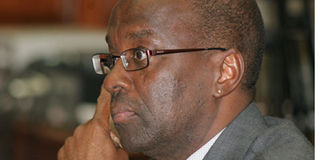Stern test for CJ over Supreme Court challenge

Dr Willy Mutunga during the vetting by MPs at County Hall in Nairobi on June 7th, 2011.
The leadership of Dr Willy Mutunga as head of the Judiciary will immediately be put to the test following the decision by women’s groups to move to court to challenge the appointment of the five Supreme Court judges by President Kibaki.
The country could be staring at a crisis if the case delays the setting up of the highest court in the land, a situation that may have not been envisaged by the architects of the new Constitution.
On Friday, High Court judge Jeanne Gacheche stopped tomorrow’s swearing-in of five Supreme Court judges who were gazetted by the President on Thursday.
Article 74 of the Constitution requires State officers to take oath before they start executing the duties of their offices.
It says: “Before assuming a State office, acting in a State office, or performing any actions of a State office, a person shall take and subscribe the oath or affirmation of office in a matter and form prescribed by the Third Schedule or under an Act of Parliament.”
But Dr Mutunga will on Monday be sworn in as Chief Justice and president of the Supreme Court and Nancy Baraza will take the oath as Deputy Chief Justice.
Once appointed, the CJ will preside over courts that will decide on the effort to block Supreme judges from taking office. He will also be the chairman of the Judicial Service Commission (JSC) which oversees the Judiciary.
According to Senior Counsel Paul Muite, the Constitution vests the appointment and removal of judges solely on the commission.
Six women’s lobby groups went to court arguing that the selection process did not uphold the principle of gender equity.
Recommended by JSC
The President appointed Justices Philip Tunoi, Mohammed Ibrahim and Jacktone Ojwang, and Dr Smokin Wanjala and Njoki Ndung’u to the Supreme Court as recommended by the JSC.
The Federation of Women Lawyers-Kenya and five other groups argued that women had been given a raw deal in the appointments.
Through lawyer Judith Thong’ori, they submitted that the JSC appointed four men and one woman contrary to the provisions of the Constitution.
The move has sparked debate on the criteria to be used to reconstitute the court to accommodate more women now that the judges have been gazetted.
But Mr Muite described the effort as “an exercise in futility” and declared that the court had no jurisdiction over the matter.
He further pointed out that the judges had already been appointed and, for one to remove them, the process must be initiated using the criteria set out in the new Constitution on removal of members of the Supreme Court. Article 168 of the Constitution says the removal of a judge would follow recommendations of a special tribunal after a thorough probe.
“They’re closing the stable after the horse has bolted,” Mr Muite said.
“They are already sitting judges of the Supreme Court, and you cannot remove them using a court process.
You can only remove them on the basis of incompetence, ethics and others issues, and the process can only be initiated by the JSC as provided for in Article 168,” he told the Sunday Nation on Saturday.
He advised the petitioners to look at the “totality” of the court, which would comprise the CJ, Deputy CJ and the five judges.
Mr Muite reckons that JSC fully complied with the law by appointing two judges to the court.
“A third of seven is 2.3 and, if one was to round off, the figure tends to be closer to two,” he said.
One third threshold
But civil society activist Ndung’u Wainaina says JSC failed to meet the one-third threshold required by the Constitution.
“There is only one woman out of five nominees.
We appeal to the JSC and Parliament to take immediate corrective measures.” Mr Muite raised concern that Judge Gacheche, who issued the orders, had herself applied for the Supreme Court job but did not make it to the shortlist.
The court petition has triggered debate on what criteria would be used to withdraw any of the judges to create room for a woman were the court to grant the orders.
Article 168 says: “The removal of a judge may be initiated only by the JSC acting on its own motion, or on the petition of any person to the JSC.” The JSC will then consider the petition and send it to the President.
The President shall, within 14 days after receiving the petition, suspend the judge from office and set up a special tribunal to probe allegations against the judge.
The tribunal would consist of a chairperson and three other members from among persons who hold or have held office as a judge of a superior court, one advocate of 15 years’ standing and two other persons with experience in public affairs.
Besides the composition, the process of interviewing the nominees has been the subject of spirited criticism with arguments that it was “hostile” to sitting judges.
The five topped a list of 25 applicants who had been short-listed for the jobs, but only 22 were interviewed.




